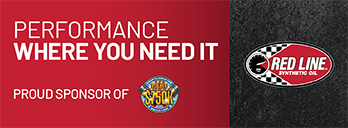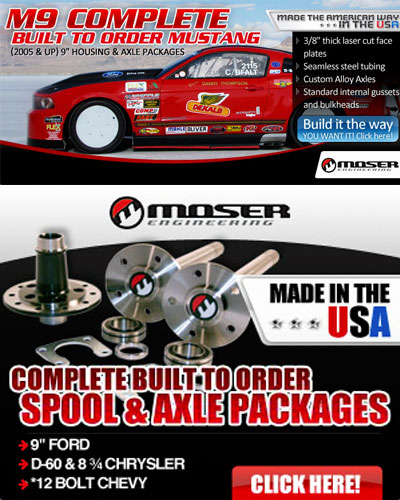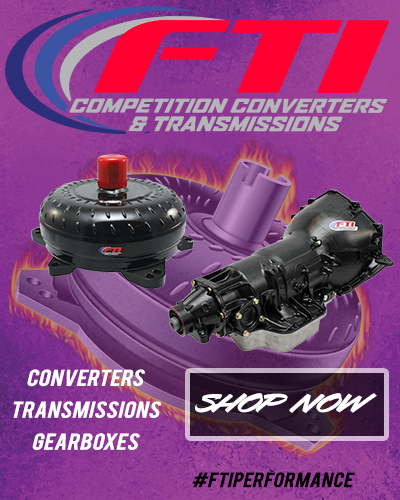LETTER TO IRS QUESTIONS NHRA TAX STATUS
The NHRA’s Not-For-Profit 501(c) status has been challenged by a currently unnamed entity.
On January 12, 2011, the Washington, DC-based law firm of Caplin & Drysdale, generated a letter on behalf of an anonymous client, requesting the Internal Revenue Service [IRS] investigate the NHRA’s current tax status.
Caplin & Drysdale has appointed Senior Partner Marcus Owens as the lead counsel for this action and in an exclusive interview with CompetitionPlus.com on Friday morning Owens confirmed his firm had in fact generated a letter requesting the IRS’s Lois Lerner, Director of Exempt Organizations Division, investigate the 501(c) status of the NHRA.
Owens, a former IRS employee who was Director of Exempt Organizations Division from 1990 – 2000, signed the letter which cites the NHRA’s activities mimic those organized by for-profit entertainment companies such as NASCAR and the IHRA.
The NHRA’s Not-For-Profit 501(c) status has been challenged by a currently unnamed entity.
On January 12, 2011, the Washington, DC-based law firm of Caplin & Drysdale, generated a letter on behalf of an anonymous client, requesting the Internal Revenue Service [IRS] investigate the NHRA’s current tax status.
Caplin & Drysdale has appointed Senior Partner Marcus Owens as the lead counsel for this action and in an exclusive interview with CompetitionPlus.com on Friday morning Owens confirmed his firm had in fact generated a letter [click here for letter] requesting the IRS’s Lois Lerner, Director of Exempt Organizations Division, investigate the 501(c) status of the NHRA.
Owens, a former IRS employee who was Director of Exempt Organizations Division from 1990 – 2000, signed the letter which cites the NHRA’s activities mimic those organized by for-profit entertainment companies such as NASCAR and the IHRA.
Owens revealed to CompetitionPlus.com his client is an amateur racer who fears backlash if his identity becomes public. Current NHRA regulations prevent any participant from competing in an event if they are in litigation with the sanctioning body. However, requesting an investigation from the IRS currently has no stipulations placed on it.
So why would Owens’ client request the investigation?
“My client is frustrated and concerned and feels like a small group has manipulated the National Hot Rod Association (to) their own personal ends as opposed to the ends of the members; as opposed to focusing on promoting the sport of drag racing,” said Owens. “[The client] feels that the organization which is a tax exempt entity is not supposed to run like a commercial enterprise, like a business with owners, and it seems to be running that way.”
The client, Owens conveyed, believes the efforts of some to improve the sport seems to be continually sabotaged by those who seek personal benefit without regard to what is in the best interests of the membership of the organization.
“The efforts [of the NHRA] to abolish the membership concept with regard to the organization is troubling to them,” Owens added.
And if you ask Owens, he’ll tell you the NHRA really doesn’t have a true “membership” by the spirit of the definition.
“The NHRA has legally no members,” he explained. “That is pursuant to existing language and its bylaws. Right now a member of the NHRA is someone who has an affinity towards the organization. It’s an affinity relationship not unlike the relationship that someone who’s a sponsor of the local symphony or the local zoo. It carries no particular privileges or rights with it that one would normally think of in terms of membership. Now for Private One C-6 purposes that category of tax exempt organization is intended to be an entity that furthers particular professions and are not supposed to be operating like a commercial entity.
“I think the concept of a member is kind of fluid on both sides here but has been construed by the NHRA to be something other than the kind of membership they had when they were first created and the members actually had a vote in what went on and what direction the organization would take.”
Owens letter to the IRS focused on various issues ranging from track ownership to top tier management compensation.
Management compensation was clearly a forefront issue. The letter points out what the client believes are salaries well above the industry standard. Owens believes NHRA President Tom Compton’s $771, 632 in taxable and non-taxable 2008 compensation was well above the average of $642,447 in 2006 for full-time compensation paid to CEOs at the ten largest trade associations in the United States. He bases his belief on the Association Compensation & Benefits Study from 2006.
In addition, the letter points out the salary paid for former NHRA President and current Chairman of the Board Dallas Gardner. According to the letter citing the 2008 Form 990, Gardner devoted 10 hours per week to NHRA in his capacity. A press release issued by the law firm on January 20 listed Gardner as one hour's worth of work weekly.
Owens contends that one of the requirements for tax exempt status under the Internal Revenue code is that trade associations avoid what is known as inurement. The tone of the letter insinuates the NHRA’s upper management has floated dangerously close to “inurement”.
By IRS definition, Inurement occurs when an “insider” of an exempt organization receives any of an organization’s net income or inappropriately uses any of its assets for personal gain. Any amount of inurement according to the IRS, no matter how small, can jeopardize an organization’s tax-exempt status.
“One of the requirements for tax exempt status under the Internal Revenue code is that the trade associations avoid what is called inurement. That is called a diversion of assets to somebody who is in a position of control that is something other than reasonable compensation,” said Owens. “A tax law concept that applies to both taxable and non-taxable organizations and basically it’s defined as compensation that’s above what similar organizations would pay for similar positions under similar circumstances. So it looks to the norms to have averages. It doesn’t mean that the organization can’t pay more it just has to be justified by special circumstances.
“What we’re simply pointing out here in the complaint is that there appears to be a pattern of quite handsome compensation that’s above the norms. It’s not clear whether that was justified or whether that was a diversion of money but it’s certainly above the norms. It’s something that we believe suggests that the activity of the NHRA is starting to act like more of a commercial business offering goods and services for sale to the public. We think it’s an indicator of ordinary commercial activity other than focused on promoting the health and industry of the sport.”
Owens alluded that his client doesn’t seek any financial compensation even though those who report tax offenders are typically paid a reward. The sole intention of this process, Owens says, is to change the way the organization does business in terms of their tax status.
“I think the client wants simply for the organization to be run to the benefit of the members and for the benefit of the sport and not for private entities,” Owens explained. “There’s never been any mention of that kind of thing [IRS reward] and in fact I don’t think it would be available because the information we’ve collected is essentially publicly available information. It’s just putting it together and putting it in the context of the tax law and bringing that to the attention of the IRS.
“It’s not like facts were uncovered that you and I couldn’t uncover on our own if we just spent some time digging. The criteria of gaining a reward are bringing something to the IRS’s attention that they couldn’t have found on their own.”
If the NHRA is to be found to be in violation of their not-for-profit status, penalties can range from a slap on the wrist to loss of non-profit status. In between the two are various financial penalties.
While it could appear that Owens represents a client with an ax to grind against the organization, he wants to make the point known his client only wants the best for drag racing, a sport the letter insinuates is at the mercy of a select few executives seeking personal gain.
“My client is a participant in the sport and feels like this organization isn’t helping further the standards of the sport and whether it’s moving rather dramatically into the vein of being a commercial business and that is changing the nature of the sport,” Owens contends.
With full knowledge of the letter's contents, the NHRA provided CompetitionPlus.com with a statement through VP of Communications Jerry Archambeault late Thursday evening. CompetitionPlus.com was the first and only media outlet to contact the NHRA requesting statement.
"NHRA was granted exempt status by the IRS decades ago and has operated accordingly ever since. In its annual tax returns filed with the IRS, NHRA has clearly laid out its operations. Since its formation in 1951, NHRA has operated to further its mission of preserving and promoting the sport of drag racing and improving safety in the sport. Founded by Wally Parks to provide a safer alternative to illegal street racing, NHRA -- then and now -- supports a broad range of activities from the grassroots to professional levels.
“Claims that NHRA is not operating properly are baseless and not supported by any action from the IRS."
Owens told CompetitionPlus.com that because of IRS policy regarding privacy, the only correspondence his firm will receive is a formal acknowledgement of receipt for the letter. This process generally takes three weeks.
Just because of his status as a former IRS employee, Owens doesn’t feel any more confident in the case than if he hadn’t held the position.
“I’m confident because of my knowledge of the tax law involved here but the fact that my name is on a complaint isn’t going to change the way the IRS looks at it one way or the other,” Owens confirmed. “There are an awful lot of former IRS employees working as tax lawyers and I’m sure the agency hears from them all the time. This year the work plan for the Exempt Organizations Division of the IRS is to have a closer look (at) among other things Section 501-C6 organizations.
“It’s an area that the IRS, independent of this complaint, identified as an area of high concern in regards to tax compliance. That work plan is a public document that is posted on the IRS website, the organization’s homepage.”
The bottom line, Owens concludes, his client just wants someone to see whether there’s been any wrongdoing. And this, he says, is for the betterment of the sport.
“Our client’s main concern is they want to be protected and they want to bring the facts to the attention of someone who can review them and whether or not there is a finality of a tax problem here.”
CompetitionPlus.com columnist Michael Knight, Senior Editor Jon Asher and Managing Editor Stan Creekmore all contributed to this report.
| {loadposition feedback} |
{source}
<div style="float:left; padding:5px;"><script type="text/javascript">
google_ad_client = "pub-8044869477733334";
/* 300x250, created 4/3/09 */
google_ad_slot = "2028912167";
google_ad_width = 300;
google_ad_height = 250;
</script>
<script src="http://pagead2.googlesyndication.com/pagead/show_ads.js" type="text/javascript"></script>
</div><div style="padding:5px;">
<script type="text/javascript">
 sr_adspace_id = 2000000613807;
sr_adspace_id = 2000000613807; sr_adspace_width = 300;
sr_adspace_width = 300; sr_adspace_height = 250;
sr_adspace_height = 250; sr_ad_new_window = true;
sr_ad_new_window = true; sr_adspace_type = "graphic";
sr_adspace_type = "graphic";</script>
<script type="text/javascript" src="http://ad.afy11.net/srad.js?azId=2000000613807">
</script></div>
{/source}





































